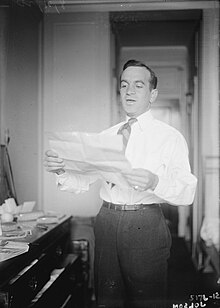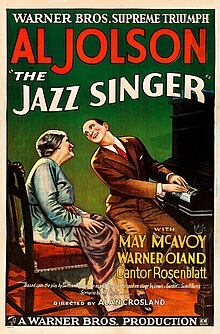Al Jolson
"[8] With his dynamic style of singing, he became widely successful by extracting traditionally African-American music and popularizing it for white American audiences who would be unwilling to listen to it when performed by black artists.
He was the fifth and youngest child of Nechama "Naomi" (née Cantor, c. 1858–1895) and Moses Rubin Yoelson (c. 1858–1945); his four siblings were Rose (c. 1879–1939), Etta (c. 1880–1948), another sister who died in infancy, and Hirsch (Harry) (c. 1882–1953).
By 1894, Moses Yoelson could afford to pay the fare to bring Nechama and their four children to the U.S. By the time they arrived—as steerage passengers on the SS Umbria arriving at the Port of New York on April 9, 1894—he had found work as a cantor at Talmud Torah Congregation in the Southwest Waterfront neighborhood of Washington, D.C., where the family was reunited.
[20] According to Esquire magazine, "J.J. Shubert, impressed by Jolson's overpowering display of energy, booked him for La Belle Paree, a musical comedy that opened at the Winter Garden in 1911.
After being shoved onto the stage by his brother Harry, he performed, then received a significant ovation: "For several minutes, the applause continued while Al stood and bowed after the first act."
The reviewer for The New York Times wrote, "He returned like the circus, bigger and brighter and newer than ever.... Last night's audience was flatteringly unwilling to go home, and when the show proper was over, Jolson reappeared before the curtain and sang more songs, old and new.
Jolson's "Wait a minute" line provoked shouts of pleasure and applause from the audience, who were dumbfounded by seeing and hearing someone speak on a film for the first time, so much so that the double-entendre was missed at first.
"[33] This opinion is shared by Mast and Kawin: this moment of informal patter at the piano is the most exciting and vital part of the entire movie ... when Jolson acquires a voice, the warmth, the excitement, the vibrations of it, the way its rambling spontaneity lays bare the imagination of the mind that is making up the sounds ... [and] the addition of a Vitaphone voice revealed the particular qualities of Al Jolson that made him a star.
[34]With Warner Bros. Al Jolson made his first "all-talking" picture, The Singing Fool (1928), the story of an ambitious entertainer who insisted on going on with the show even as his small son lay dying.
However, these films gradually proved a cycle of diminishing returns due to their comparative sameness, the regal salary that Jolson demanded, and a shift in public taste away from vaudeville musicals as the 1930s began.
It is Mr. Jolson's best film and well it might be, for that clever director, Lewis Milestone, guided its destiny ... a combination of fun, melody and romance, with a dash of satire...."[38] Another review added, "A film to welcome back, especially for what it tries to do for the progress of the American musical...."[39] In 1934, he starred in a movie version of his earlier stage play Wonder Bar, co-starring Kay Francis, Dolores del Río, Ricardo Cortez, and Dick Powell.
In this film, he notes, "Jolson had the confidence to rhyme 'Mammy' with 'Uncle Sammy'", adding "Mammy songs, along with the vocation 'Mammy singer', were inventions of the Jewish Jazz Age.
[50] In a tribute to Jolson, Larry Parks wrote, "Stepping into his shoes was, for me, a matter of endless study, observation, energetic concentration to obtain, perfectly if possible, a simulation of the kind of man he was.
[55] To support his view he describes a significant part of the movie: While wandering around New Orleans before a show with Dockstader's Minstrels, he enters a small club where a group of black jazz musicians are performing.
Dockstader performs the inevitable function of the guardian of the status quo, whose hidebound commitment to what is about to become obsolete reinforces the audience's sympathy with the forward-looking hero.
His own 1930s shows included Presenting Al Jolson (1932) and Shell Chateau (1935), and he was the host of the Kraft Music Hall from 1947 to 1949, with Oscar Levant as a sardonic, piano-playing sidekick.
Writer Hal Kanter recalled that Jolson's own idea of his television debut would be a corporate-sponsored, extra-length spectacular that would feature him as the only performer, and would be telecast without interruption.
[60] Japanese bombs on Pearl Harbor shook Jolson out of continuing moods of lethargy due to years of little activity and "... he dedicated himself to a new mission in life....
"[62] Shortly after the war began, he wrote a letter to Steven Early, press secretary to President Franklin D. Roosevelt, volunteering "to head a committee for the entertainment of soldiers and said that he "would work without pay ... [and] would gladly assist in the organization to be set up for this purpose".
A few weeks later, he received his first tour schedule from the newly formed United Services Organization (USO), "the group his letter to Early had helped create".
[65]After returning from a tour of overseas bases, the Regimental Hostess at one camp wrote to Jolson, Allow me to say on behalf of all the soldiers of the 33rd Infantry that you coming here is quite the most wonderful thing that has ever happened to us, and we think you're tops, not only as a performer, but as a person.
In 1946, during a nationally broadcast testimonial dinner in New York City, given on his behalf, he received a special tribute from the American Veterans Committee in honor of his volunteer services during World War II.
Two weeks after signing the agreement, while playing cards in his suite at the St. Francis Hotel at 335 Powell Street in San Francisco,[78] Jolson died of a massive heart attack on October 23, 1950.
The six-pillar marble structure is topped by a dome, next to a three-quarter-size bronze statue of Jolson, eternally resting on one knee, arms outstretched, apparently ready to break into another verse of "Mammy".
The inside of the dome features a huge mosaic of Moses holding the tablets containing the Ten Commandments, and identifies Jolson as "The Sweet Singer of Israel" and "The Man Raised Up High".
As told by actor-comedian Alan King, it happened during a dinner by the New York Friars' Club at the Waldorf Astoria in 1946 to honor the career of Sophie Tucker.
As "one of the biggest stars of his time, [he] worked his magic singing Harding, You're the Man for Us to enthralled audiences ... [and] was subsequently asked to perform Keep Cool with Coolidge four years later.... Jolson, like the men who ran the studios, was the rare showbiz Republican.
[99] According to music historians Bruce Crowther and Mike Pinfold: "During his time he was the best known and most popular all-around entertainer America (and probably the world) has ever known, captivating audiences in the theatre and becoming an attraction on records, radio, and in films.
"[126] Playwright Samson Raphaelson, after seeing Jolson perform his stage show Robinson Crusoe, stated that "he had an epiphany: 'My God, this isn't a jazz singer', he said.
He also brought a black dance team from San Francisco that he tried to put in a Broadway show,[129] and demanded equal treatment for Cab Calloway, with whom he performed duets in the movie The Singing Kid.

















